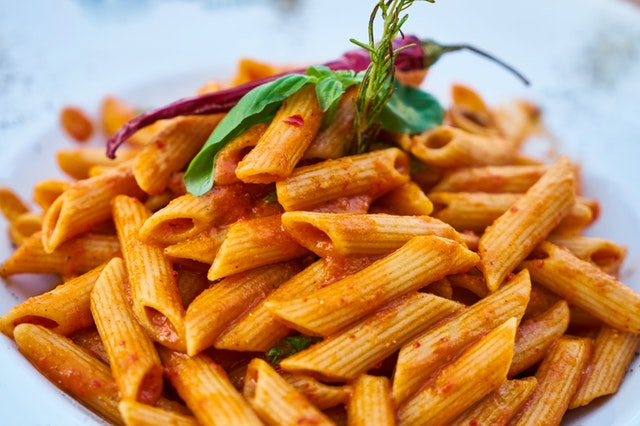Carbohydrates
Carbs activate the buildup of body fat (through the hormone insulin) and prevent muscle-building and fat-burning hormones. Dietary fats have no such effect on hormones. Fats are crucial material for testosterone production.
All carbohydrates don’t produce an equal speed of insulin response. Simple carbs such as sugar, bread, etc., produce a quick insulin response. Complex carbs such as beans, lentils, peas, potatoes, rice…, and whole unprocessed grains such as oats, barley, and rye – produce slower insulin response.
Slower or faster, carbs convert to sugars which convert to body fat.
Fruits contain sugars. Juiced fruits create stronger insulin responses than when consumed whole (not juiced) and not in great amounts. Juicing the fruit means eliminating all the fiber. Fruits contain dietary fiber which is the most complex carb. The fiber is not broken down in the body. It is completely wasted and as such it doesn’t have any caloric value. Fiber slows down the breakdown of sugar and thus produces a slower and lower insulin response. Eat your fruits whole and in very moderate amounts.
Although fruits are healthy, for example, 100 grams of an apple contains 10 grams of sugar, which is the same as 100 grams of the usual soft drinks.
Nutrition which is beneficial to hormones has dietary fiber as its integral part. Green salads are a better source of dietary fiber and they contain an insignificant amount of sugars.
Don’t be swayed by the story of complex and simple carbs. If the reserves of stored sugars (in your muscles and liver) are full, whichever carbs you ingest, the rest of them that were not used for momentary energy needs will be converted to fat and stored as body fat.
Proper nutrition includes meat, cheese, eggs (whites and yolks too), fish, no soy (for men), green salads, healthy oils, and at least two liters of water daily. Protein intake should be around 1.5-2.5 grams per kilogram of body weight. Fat intake should be around 1-3 grams per kilogram. Carbs should be in total 40 grams daily. All these parameters need to be determined precisely depending on your body type and your goals.
Carbs from salads (fiber) do not count toward these 40 grams. Fiber is not converted to sugar and does not cause an insulin response.
If you lower your carb intake, you may have cravings for bread, pies, pizzas, pasta, sweets, etc. Such cravings can be lowered with an increased intake of green salads which will help you to feel fuller, and more satiated. And increase the intake of healthy oils. After a few days, such cravings will wear off. (The body is an adaptive mechanism).
 Carbs are needed to a certain degree for the body. There are cells in the body that need carbs. If there is a lack of carbs, the body will produce the needed amount from the protein you eat! But mainly it will have enough intake of carbs from the salads. Keep your carbs at a minimum and reap the benefits from the increased growth hormone.
Carbs are needed to a certain degree for the body. There are cells in the body that need carbs. If there is a lack of carbs, the body will produce the needed amount from the protein you eat! But mainly it will have enough intake of carbs from the salads. Keep your carbs at a minimum and reap the benefits from the increased growth hormone.
Dietary fats
Your body uses dietary fat for many purposes. One of them is producing energy. Another is making hormones and other important compounds. Certain vitamins as vitamins A, D, and E are absorbed only in the presence of dietary fats. Because vitamin D is important for the absorption of calcium, thus fats aid the calcium absorption in the body.
Fats create a longer-lasting sensation of satiety after a meal.
Insulin stores fats and/or carbs. But carbs are those which cause great insulin spikes, fats not. Many food additives spike insulin which are not carbs.
If you don’t consume large amounts of carbs, it will mean minimal insulin response. And the fats you ingest will not be stored. If you consume carbs excessively and frequently (= frequent high blood sugar and high insulin), this will disrupt the growth of new muscle mass and will cause fat gain. Insulin blocks using your body fat for fuel. Instead, it will convert and store carbs as fat:
And we see a person trying to burn excess fat by running the body which greedily stores and turns sugar into fat. Or the person trying to build muscle (enabled by growth hormone), exercising the body dominated by high blood sugar which lowers growth hormone.
If you don’t consume great amounts of carbohydrates, there will be no large insulin response and no fat storage. And the protein will take care of the fats, so they will be used. Growth hormone plays a major role in this.
Proper nutrition supported by a proper training regime will keep your body in a state of using fat for energy.
Thus the myth that says “to lose weight you need to burn more than what you ingest and to build more mass you need to ingest more than what you burn” – is a myth and a harmful one. It can result in much torture to lose weight or in much torture to gain muscle mass. That theory doesn’t say what to eat and how much, just counts the calories pretending they come from identical nutrients with identical properties. A huge, deep-seated, insidious myth.






